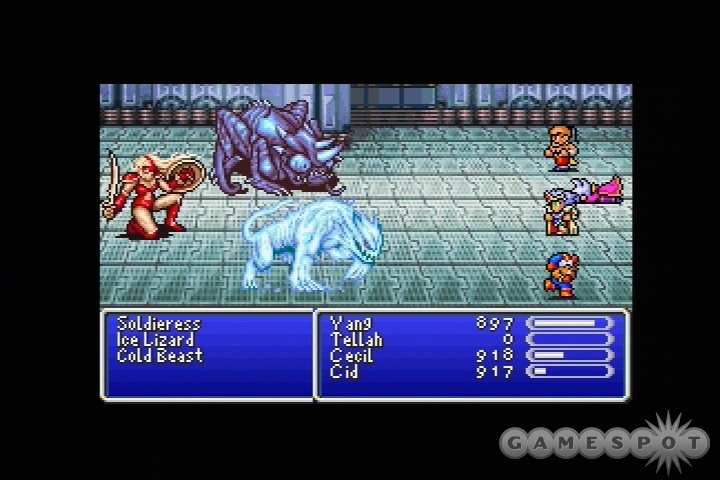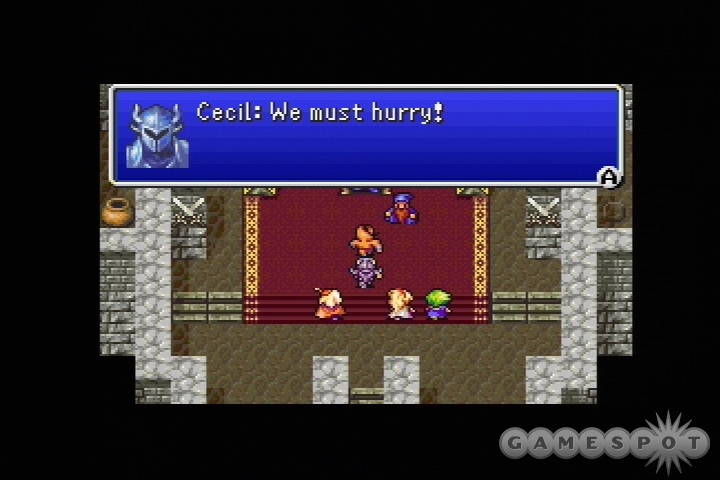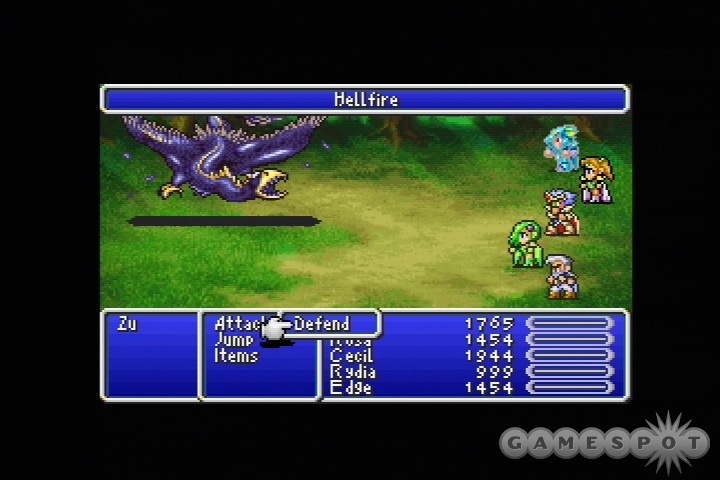All these years after its humble beginnings on the Nintendo Entertainment System, Final Fantasy remains widely regarded as one of the best, longest-running role-playing game series out there. Despite how recent installments have pushed video game production values to new heights, many longtime fans maintain that Final Fantasy IV (known as Final Fantasy II when it was released in North America in '91) is the breakthrough game in the series. Featuring a fast-paced, emotionally charged story and a cast of memorable characters, plus dozens of hours' worth of entertaining gameplay, Final Fantasy IV set the tone and the high standard for subsequent installments. Now you can experience this classic on the Game Boy Advance, and sure enough, it's as great as ever.

Final Fantasy IV is about Cecil, a dark knight and captain of the Kingdom of Baron's mighty airship fleet. Baron's increasingly warlike tendencies push Cecil into a moral quandary at the beginning of the game, but the moment he questions his orders, he's stripped of his rank and given the lowly task of delivering a package to a nearby town. Cecil is shocked at what happens when he reaches his destination, and becomes determined to find out what's causing his kingdom's corruption and evil. He'll meet many unusual friends and foes during his lengthy adventure, and will even undergo a dramatic transformation as he casts aside his past training in favor of a path of true righteousness.
Final Fantasy IV's story is still one of the best things about it, due to how effectively it twists and turns and how well it handles exposition. Back in the day, it was amazing that this game started you off as a highly capable warrior, rather than the typically inexperienced RPG hero. What's more, new characters are introduced in context rather than with ham-fisted or long-winded background information. We learn right away that Cecil is romantically involved with Rosa but that their relationship is strained due to Cecil's military background; and we also know that Cecil's got a faithful friend in Kain, a fellow soldier of Baron. Other characters, like the vengeful old sage Tellah and the brash ninja prince Edge, are some of the most memorable that the Final Fantasy series has ever created. The game effectively pushes its story along with numerous scripted sequences, set to a stirring musical score that effectively captures just the right dramatic tone. At times, the story may seem a bit predictable or kid-friendly, but in its heyday this game pioneered the whole concept of dramatic storytelling in an RPG.
This is a nearly exact translation of Final Fantasy II for the Super Nintendo Entertainment System, and it would take a hardcore fan of the original to notice the differences. Most of the changes are clear-cut improvements. For example, the English dialogue is better and more coherent than in the original North American version, while remaining faithful to the original script. Fans of the original might still be a little put off by a few changed names here and there, though. The character portraits and backgrounds are also slightly redrawn, and the text is bigger and more legible--perfect for the Game Boy Advance's screen and very clear even on the Game Boy Micro. The game also sports a new quicksave feature that lets you instantly save your progress at any point, though this data is deleted as soon as you resume play. You'll still need to use save points to permanently save your progress, but having the option to save any time outside of battle definitely helps if you like to play in short bursts. The meticulous ones out there will appreciate the new "bestiary" menu option, letting them review data on any of the hundreds of monsters in the game they've defeated. There's even a big new dungeon that's accessible towards the end of the game, which might entice you to keep playing even after you finish the main quest. Not all the game's sound effects match the original's exactly, but other than that, the presentation is pretty much spot-on. The game still looks very good after all these years, and series composer Nobuo Uematsu's musical score is as thrilling and memorable as ever.

If you're experienced with Final Fantasy II for the SNES, you'll also pick up on a few minor but possibly surprising gameplay differences in this version, mostly in how some of the characters have special abilities that weren't in the game you remember. For example, Cecil starts off with a fairly powerful area-effect attack that draws on his own life force. Extra abilities like these were stripped from the game for its original North American release and frankly don't have much impact one way or the other--but at any rate, stuff like this and the new dungeon helps make Final Fantasy IV Advance a worthwhile experience even for those of us who've already played a ton of this game for the SNES. It's fun to play through and spot the minor tweaks.
The gameplay itself is great, and if anything, it serves to show how little role-playing games have evolved since Final Fantasy IV helped redefine them. While traveling in the wilderness or in the game's numerous dungeons, caverns, and other dangerous places, you'll randomly encounter groups of enemies fairly frequently. However, combat resolves quickly and you can easily flee from most battles, preventing all the fighting from becoming annoying. You can have up to five characters in your party at a time, and the game features an "active time battle" system that combines turn-based tactics with the need for urgency, because your foes will keep attacking you if you just sit there doing nothing. Your characters' turns come up based on their speed ratings, and you'll need to consider the amount of time it takes to execute a particular move before you commit to it. Some of the stronger spells or special moves in the game take a while to pull off, so it's often wise to perform quick strikes rather than rely solely on your most powerful attacks. Many enemies also have elemental vulnerabilities or immunities you'll need to consider, and your own allies each have their own distinctive strengths. As you win successive battles, your characters will quickly gain experience levels and money. There's a ton of different equipment to be purchased and found throughout the game, much of which has unique properties that can be discovered in battle. Your allies will also come and go during the course of the story, and together, all this helps ensure that the core action in Final Fantasy IV continues to be challenging and enjoyable for many hours. Experienced players should be able to finish the game in 15 hours or so, but it'll take the average player closer to 25.

In its day, this game's graphics were quite amazing, especially the pseudo-3D flying sequences that really made you feel like you were soaring high above the ground, effortlessly avoiding all those nasty monsters lurking below. Thankfully, the flight sequences still look impressive, and the rest of the game's finely crafted 2D artwork still looks good, too. The squat-looking little characters you'll see in the top-down perspective when you're moving from place to place are pretty simple, while the side-view battle sequences feature a close-up perspective where the lavishly detailed monsters will naturally draw your attention. The monsters aren't animated but still look great, and the extensive variety of different background settings help create an epic feel. You'll also appreciate some of other little visual touches, like how all the different weapons in the game have different looks and effects when used in combat. But if there's one aspect of the game's presentation that still really shines, it's definitely the music. Thankfully, the musical score hasn't been tampered with, and serves to liven up the entire experience. Even though certain tracks (like the battle music) play frequently and loop often, the compositions are so good that you'll love listening to this game. Other than the soundtrack, the game's audio effects are sparse but effective.
It's hard to tell why Square Enix took so long to bring Final Fantasy IV to the Game Boy Advance, but all the time that's elapsed since the game was originally released has done little to tarnish its quality. If you were fortunate to have played the game in its heyday, know that there are enough subtle differences in this version to make experiencing the game again feel fairly fresh. And if you either got in to the Final Fantasy games later on in the series, or just haven't played this game before, don't miss out on it this time around. After all, even if you set aside this game's importance to the Final Fantasy series and role-playing games as a whole, the bottom line is that Final Fantasy IV Advance is a captivating, long-lasting game filled with exciting battles, great characters, and incredible music.



